News
64 dead in Papua New Guinea tribal violence
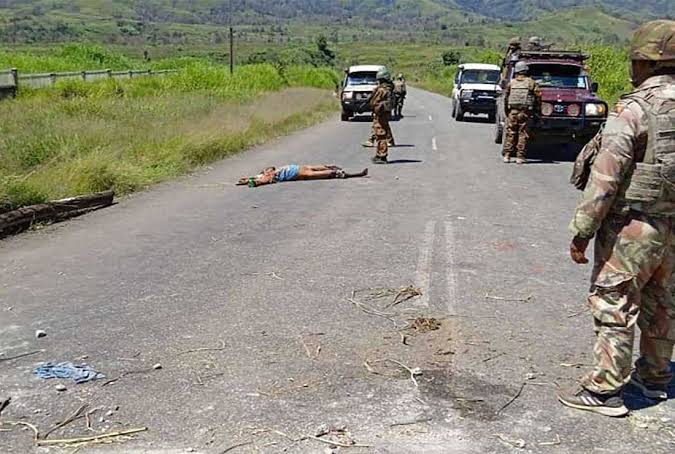
By Francesca Hangeior
At least sixty-four bloodied bodies have been found along a stretch of road in Papua New Guinea’s remote highlands, police said Monday, a gruesome escalation of long-running violence between local warring tribes.
The victims were believed to be tribal fighters who were ambushed by a rival group in the early hours of Sunday.
The incident occurred near the town of Wabag, about 600 kilometres (370 miles) northwest of the capital Port Moresby.
The rugged and lawless area has for years been the scene of tit-for-tat mass killings between rival Sikin, Ambulin, Kaekin and other tribesmen.
Graphic police images from the scene showed stripped and bloodied bodies lying by the side of the road and piled up on the back of a flatbed truck.
Some men had limbs hacked and were left naked by the road with beer bottles or cans placed on their chests.
Police on Monday said gunfights were ongoing in nearby valleys and bodies were still being recovered from bushland near the road.
“We believe there are still some bodies… out there in the bush,” Assistant Commissioner of Police Samson Kua said.
Clans have fought each other in Papua New Guinea’s highlands for centuries, but an influx of mercenaries and automatic weapons has made clashes more deadly and escalated the cycle of violence.
Kua said the gunmen had used a veritable armoury, including SLR, AK-47, M4, AR15 and M16 rifles, as well as pump-action shotguns and home-made firearms.
The province’s acting police commander Patrick Peka said many of the dead were believed to be mercenaries — men who roam the countryside offering to help tribes settle scores with their rivals.
“The police and government cannot do much when leaders and educated elites supply arms, ammunitions and engage the services of gunmen from other parts of the province,” Peka said.
Papua New Guinea’s government has tried suppression, mediation, gun amnesties and a range of other strategies to control the violence, with little success.
The military had deployed about 100 troops to the area, but their impact has been limited and the security services remain outnumbered and outgunned.
The killings often take place in remote communities, with attackers launching raids or ambushes in revenge for previous attacks.
Civilians, including pregnant women and children, have been targeted in the past.
The murders are often extremely violent, with victims hacked with machetes, burned, mutilated or tortured.
Police privately complain that they do not have the resources to do the job, with officers so badly paid that some of the weapons that end up in the hands of the attackers have come from the police force.
Opponents of Prime Minister James Marape’s government on Monday called for more police to be deployed and for the force’s commissioner to resign.
Papua New Guinea’s population has more than doubled since 1980, placing increasing strain on land and resources and deepening tribal rivalries.
Anthony Albanese, the prime minister of neighbouring Australia, on Monday described the incident as “very disturbing”.
“We are providing considerable support, particularly for training police officers and for security in Papua New Guinea,” he told public broadcaster ABC.
“We remain available to provide whatever support we can.”
News
Christian leaders to stage protest over Plateau killings during Easter

*Says, will not be silent
By Francesca Hangeior
Christian leaders in Plateau have announced plans to stage a protest over the unending attacks and killings in the state.
The protest, scheduled for Easter Monday, will be held under the banner of the “2nd Peace Walk Against Continuous Killings”.
Dr Gideon ParaMallam, president of the Gideon and Funmi Peace Foundation and a member of the protest planning committee, confirmed the development.
ParaMallam said the procession was organised by denominational leaders and the Plateau chapter of the Christian Association of Nigeria (CAN).Nigerian cultural tours
His words: “Between March 27th and April 2nd, 2025, nearly 80 innocent lives were brutally cut short in Bokkos local government area. This does not include Bassa LGA and other parts of Nigeria.
“As a mark of honour for the dead and a cry for justice, the Church is organising a 2nd Peace Walk to demand an end to these senseless, unprovoked, and continuous attacks in Plateau state and other parts of Nigeria.
“We must not be silent. We must not allow their blood to cry out unheard.”
He said the protest would begin at the PRTV roundabout in Jos and end at the New Government House in Little Rayfield.
ParaMallam said the demonstrators will deliver their demands to President Bola Tinubu through Plateau Governor Caleb Mutfwang.
He called on all Christians in the state to join the procession dressed in black as a symbol of mourning.
He said: “The protest is a call for peace, justice, and security for every life on the Plateau and across Nigeria.
“We have asked all Christians to wear black to church on Easter Sunday, 20th, and during the Peace Walk on Monday, 21st.
“Black, red, and white clothes are to be worn as visible symbols of our mourning — black for grief, red to call for an end to the killings, and white to represent peaceful resistance to impunity.”
The protest follows a series of deadly attacks in Plateau.
News
Gunmen invade Plateau community in fresh attack, Kill 40 People
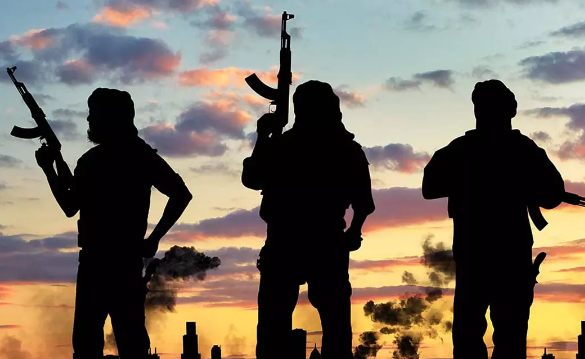
By Francesca Hangeior
At least forty people have been reportedly killed in a fresh assault on the Zike community, Kimakpa, Kwall district of Bassa Local Government Area of the state.
Despite reassurances from government authorities, the spate of attacks in Plateau has continued.
According to a Kwall community leader, Wakili Tongwe, the attackers invaded the village in the early hours of Monday and shot sporadically at residents who were scampering for safety after hearing gunshots.
The community leader told Channels Television on the phone that a team of vigilantes, including himself and some security personnel, were on patrol in another community when the attackers invaded the village and started shooting.
Though the security personnel engaged the invaders and succeeded in repelling the attackers, the damage had been done, with about thirty-six persons shot dead and four others dying later.
Some other residents sustained gunshot wounds and are receiving medical attention at the hospital.
Security agencies in the state are yet to comment on the attack, which is coming less than two weeks after fifty-two persons were killed in some communities of the Bokkos Local Government Area of the North-Central state.
Plateau State has, for several decades, been a hotbed of killings, with gunmen sacking entire communities. About 200 people were killed at Christmas 2023 celebrations during a bloody attack on a majority Christian community. In May last year, around 40 people were killed and homes torched in the town of Wase.
Experts blame the fight for resources between farmers and herders as a major cause of the attacks.
But the governor of the state, Caleb Muftwang, says there is more to the attacks.
“I can tell you in all honesty that I cannot find any explanation other than genocide sponsored by terrorists. The question is, who are the persons behind the organisers of this terrorism? This is what the security agencies must help us to unravel,” the governor said on a recent edition of Channels Television’s Politics Today.
He said bandits have taken over 64 communities in the state.
“As I am talking to you, there are not less than 64 communities that have been taken over by bandits on the Plateau between Bokkos, Barkin Ladi, and Riyom local governments,” Muftwang said. “They have been taken over, renamed, and people are living there conveniently on lands they pushed people away to occupy.”
The Federal Government has been talking tough following the recent wave of attacks, vowing to flush out the assailants. The Inspector General of Police (IGP), Kayode Egbetokun, “ordered the immediate and comprehensive deployment of police tactical assets to the affected areas of the state”.
News
Just in: Namibia Moves to Deport Over 500 Americans in Bold Visa Policy Shift
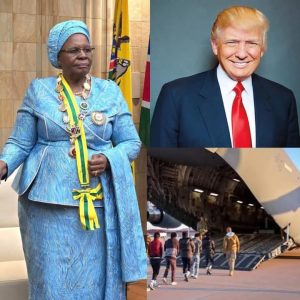
In a shocking diplomatic move that is making waves across the globe, Namibia has announced plans to deport over 500 American nationals currently residing in the country without valid visas.
The decision comes as part of a sweeping policy overhaul led by President
Netumbo Nandi-Ndaitwah
aimed at asserting reciprocity and strengthening Africa’s sovereignty on immigration matters.
“If Africans need visas to enter the United States, then Americans must also need visas to enter Namibia,” the President declared firmly during a nationally televised address. “This is not aggression — it is fairness. It is dignity.”
According to government sources, the Americans targeted for deportation are individuals who have overstayed or entered without proper documentation. Immigration officials have already begun serving notices, and coordinated efforts with law enforcement are underway to ensure a lawful and orderly process.
The move has ignited debate worldwide, with some calling it a bold stance for equity in international relations. Others are urging caution, warning of potential diplomatic fallout.
But the Namibian leader appears undeterred.
In a separate announcement, the President revealed ongoing efforts to make Namibia a visa-free country for all African nations, promoting intra-African travel, trade, and unity. “It’s time we stop treating our African brothers and sisters like foreigners on their own continent,” she said. “Africa must rise — and we must rise together.”
The policy shift has been hailed by many Pan-African advocates as a landmark moment in Africa’s geopolitical awakening.
As reactions pour in from Washington and other world capitals, all eyes are now on Namibia — a small nation making a mighty statement on the global stage.
-

 News20 hours ago
News20 hours agoTinubu’s ugly past shores up as US Judge orders DEA, FBI to release files
-

 News8 hours ago
News8 hours agoAutonomy: 774 LGs challenge FG, states in court Tuesday
-

 Sports18 hours ago
Sports18 hours agoJust in: Newcastle pummel Man United 4-1
-

 News18 hours ago
News18 hours ago2027: Atiku’s Opposition Front is a mission impossible-Wike declares
-

 Economy24 hours ago
Economy24 hours agoSEE Current Black Market Dollar (USD) To Naira (NGN) Exchange Rate
-
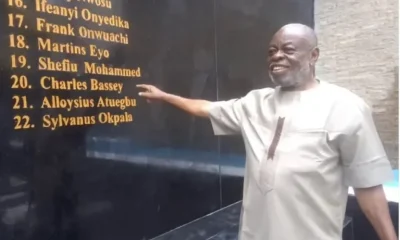
 News19 hours ago
News19 hours agoSAD! Another Christian Chukwu’s team mate, Charles Bassey is dead
-

 News24 hours ago
News24 hours agoJapa : Illegal Immigrants Can Now Stay Based On Boss Recommendations in US
-
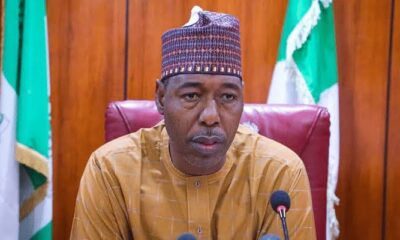
 News7 hours ago
News7 hours agoZulum orders arrest, offers house, scholarship to abused boy in viral video





